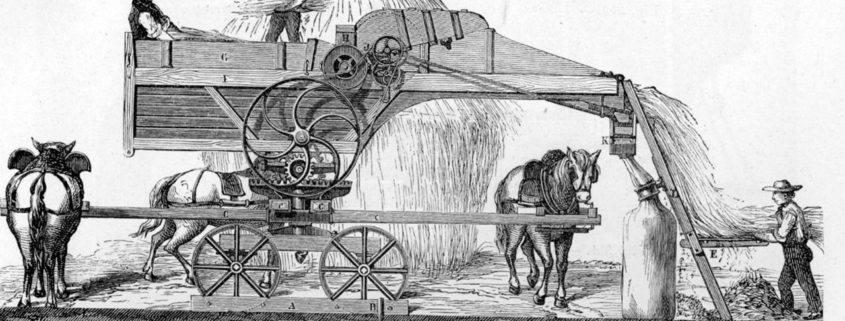“Swing” Rioters Smash Machinery at Pythouse near Tisbury
On 25 November 2020 local historian Christina Richard wrote:
‘It’s a miserable wet morning in Tisbury and it’s worth remembering that 190 years ago to the day, local agricultural workers rioted to draw attention to their appalling low wages – 7s per week. Common land had already been enclosed locally, taking away their right to run a cow, geese or a pig on communal land. Many of them were nearly destitute, and now the introduction of threshing machines by the local farmers would deprive them of casual work during the winter.
So spare a thought for them – they broke up the threshing machines at Fonthill Gifford, Lawn, and in other places, eventually falling foul of John Benett at Pythouse, and crossing swords (sticks in their case) with the Hindon branch of the Yeoman Cavalry. Many were arrested, and taken by cart to Salisbury Gaol where they were all tried, some were found guilty, transferred to the horrible prison hulk York in Portsmouth Harbour and eventually transported to Van Diemens Land (Tasmania), where most of them had to stay until they died, even after they were granted ticket of leave and pardoned – how could they afford to come home?.
So. happy 25 November. Some of their names are familiar to us – Macey, Mould, Burt, Gray, Jerrard, Rixon, Sanger, Snook, Topp, Targett and Vining. Most were in their mid twenties with small children. Their wives took over the agricutural labouring in order to feed their families.
Puts lockdown into place, doesn’t it?’
Christina. who published The Grotto Makers: Joseph and Josiah Lane of Tisbury in 2018, is presently researching the story of the Pythouse Riot. It was one of many hundreds of agricultural disturbances across southern counties in the autumn of 1830, supposedly led by the mythical “Captain Swing”. The “Battle of Pythouse” was notable for its violence and one unfortunate labourer, John Harding, was killed. The inquest jury returned a verdict of justifiable homicide. Rural distress among the labouring poor continued, and in 1834 the Tolpuddle Martyrs were sentenced to transportation at Dorchester Assizes after attempting to form a Trade Union to resist wage cuts.



